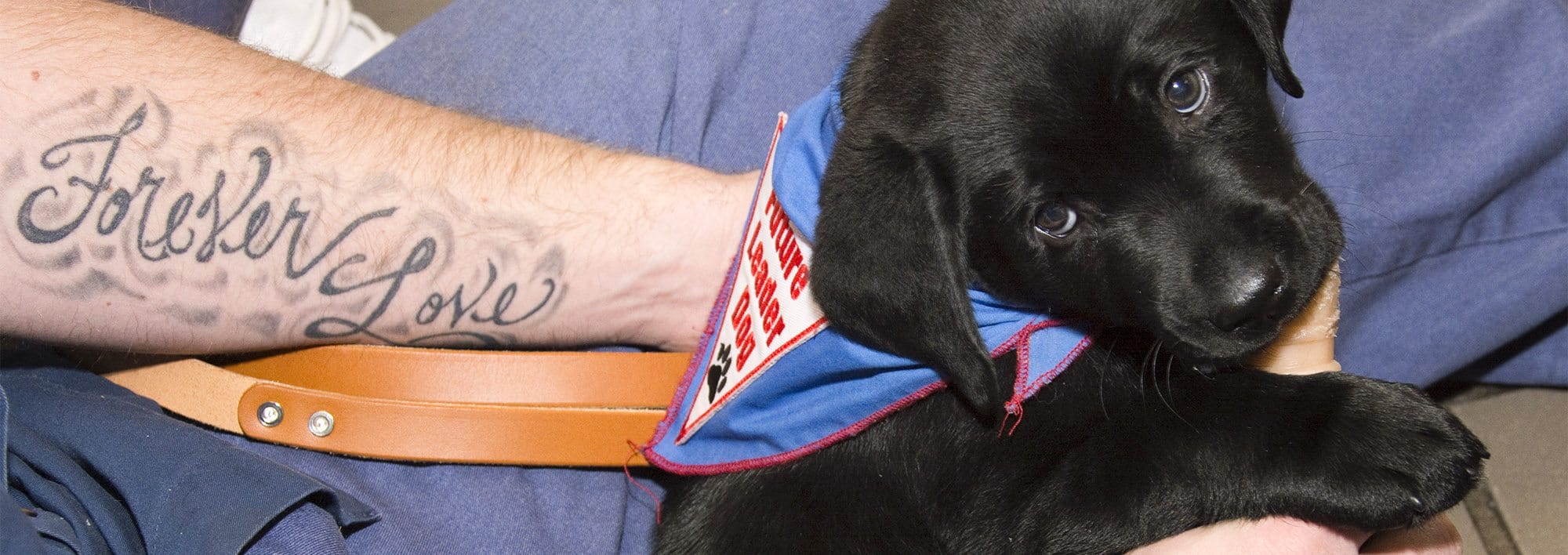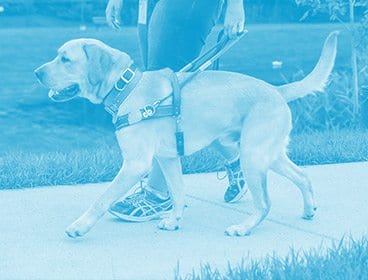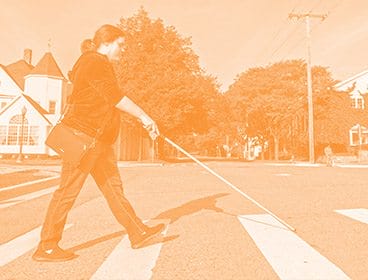
Prison Puppies
The Prison Puppies initiative of Leader Dog mirrors puppy raising on the outside. Seven-week-old puppies are brought to the prison and given to a single inmate or a team of two to three inmates to raise. The raisers are committed to spending the next 12–15 months caring for this Future Leader Dog.
In order to have the opportunity to raise a puppy, inmates are required to submit an application and participate in an interview conducted by the correctional facility. Applicants are screened closely and only those who have demonstrated good behavior while being incarcerated are given the opportunity to volunteer.
To prepare puppies for their lives as guide dogs, puppy raisers socialize them through exposure to different kinds of people, vehicles and dogs. Each inmate or team is responsible for building a solid foundation of skills including basic obedience, teaching the puppies how to eliminate outside on cue, calm and controlled greetings, and settling quietly in the midst of distractions.
Volunteer puppy counselors host one to two training sessions per month at the correctional facility in which the inmates are required to attend with their puppies in hand. It is the puppy counselor’s duty to teach the raisers all of the necessary tools in which to raise a successful puppy. Of course, not everything can be covered during training, so inmates are given raising manuals and a list of supplemental information to review on their own.
Prison Puppies are supported financially 100% by Leader Dogs for the Blind. Food, toys, collars, leashes and veterinary care are made available to all puppies, though the inmate raisers are given the responsibility to feed, play with and otherwise care for the puppies 24 hours a day. Although the puppies are a full-time job, the inmate puppy raisers are truly volunteers. Many inmates are still required to hold a separate job within the prison; in many cases the puppies attend work with their raisers.
Some of Leader Dog’s most successful guide dogs come out of the Prison Puppies initiatives. To date, hundreds of puppies have been raised in the prison system.
The initiative also has a profound impact on prisoners’ rehabilitation. According to the wardens, the puppies are a positive morale booster among both inmates and the prison staff. The dogs help reduce tensions and foster better social interactions within the prisons, and working with the dogs helps inmates develop patience, dependability, compassion and self-esteem. Prisoners report that they are happy to have the opportunity to give back and help a person in need.
Prison Puppies currently operates in 12 facilities in three states:
- The Minnesota Correctional Facility – Lino Lakes state prison in Lino Lakes, MN
- Baraga Correctional Facility in Baraga, MI
- Bellamy Creek Correctional Facility in Ionia, MI
- Chippewa Correctional Facility in Kincheloe, MI
- G. Robert Cotton Correctional Facility in Jackson, MI
- Macomb Correctional Facility in New Haven, MI
- Richard A. Handlon Correctional Facility in Ionia, MI
- Ionia Correctional Facility in Ionia, MI
- Oaks Correctional Facility in Manistee, MI
- Marquette Branch Prison in Marquette, MI
- Central Michigan Correctional Facility in St. Louis, MI
Prison Puppies is proven to be a win, win, win project: inmates have the opportunity to develop responsibility and positive personal skills, Leader Dogs for the Blind has a pipeline of well-trained dogs primed to begin their formal instruction, and Leader Dog’s clients receive exceptional canine partners who help them live more independent and fulfilling lives.



